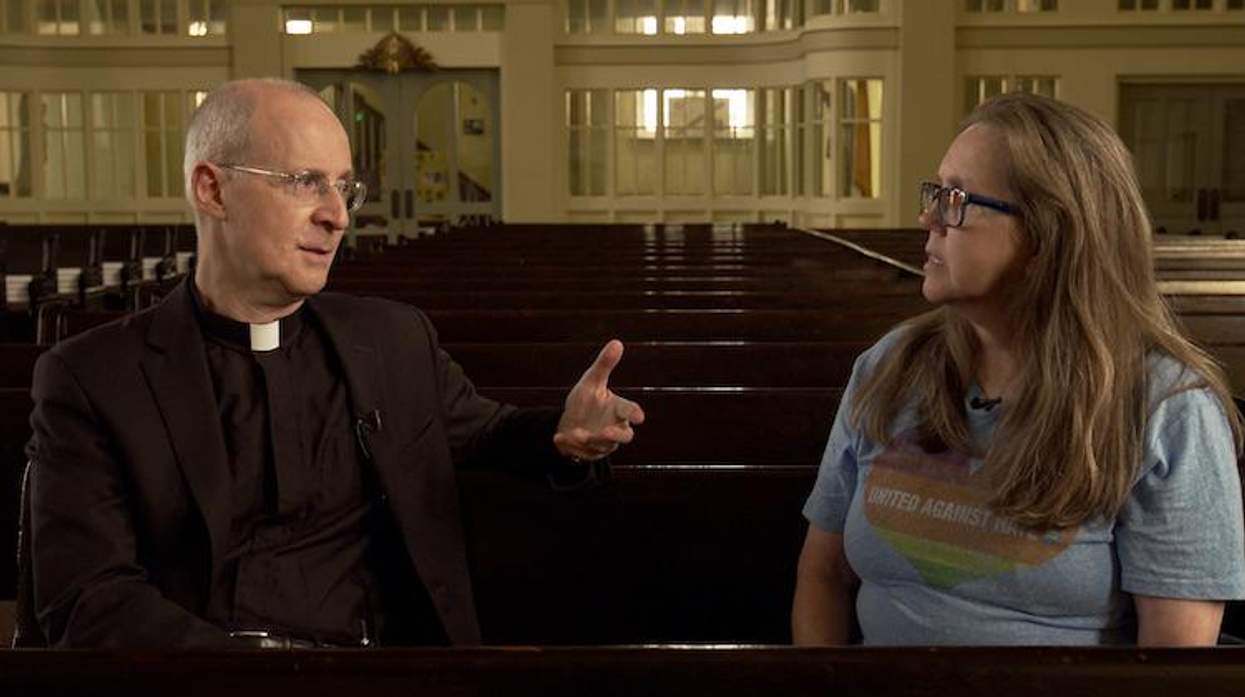The gulf between the Roman Catholic Church and LGBTQ+ people may seem unbridgeable, but the filmmakers behind a new documentary -- and their subject -- hope to show audiences that's not so.
Building a Bridge, available Tuesday via video on demand, follows Father James Martin as he spreads the word that there's a place for LGBTQ+ people in the church -- and that the church needs to be more loving and welcoming toward them. Martin has been offering that message for years, including in a book of the same name, published in 2017, but he and co-directors Evan Mascagni and Shannon Post expect that the film will reach an even wider audience.
The idea of making a film about Martin originated with Mascagni, who was brought up Catholic in Kentucky but stopped practicing the faith when he went to college. His mother, still a devout Catholic, sent him some information on Martin, and Mascagni was impressed.
Martin's way of thinking "was very different from the Catholic Church I experienced growing up in Kentucky," Mascagni says. The filmmaker, a straight ally to the LGBTQ+ community, then contacted Post, a queer woman, about the possibility of making a movie on Martin.
Post had wanted to make a film relating to the 2016 mass shooting at Orlando's Pulse nightclub, which had a mostly LGBTQ+ clientele. She often went to the bar while in college. She found out it was the tragedy that had inspired Martin's book -- he had been outraged that Catholic officials, in statements mourning the victims, often failed to acknowledge their LGBTQ+ identity.
So the two approached Martin, who says he was open to the idea of a documentary but wasn't sure a finished film would come from the effort. But it did, and it premiered at the Tribeca Film Festival in New York City last year and now is available on a variety of video platforms. The filmmakers call their experience with Martin inspiring.
"I came away a lot less cynical than I was," Mascagni says. "I just became really inspired by Father Martin's approach."
"I think I'm more hopeful now," Post adds.
The movie has attracted the attention of one of the nation's most prominent filmmakers -- Martin Scorsese, whose Catholic background has informed much of his work. Scorsese saw a rough cut of the documentary and offered some advice; he is credited as executive producer.
The film tracks Martin as he talks with a variety of audiences to encourage reconciliation between the church and LGBTQ+ Catholics (and their allies). It includes people receptive to his message, such as Christine Leinonen, whose son Drew, a friend of Post's, died at Pulse, and a family with three children who identify, respectively, as queer, bisexual, and transgender. It also features one of his strongest critics, Michael Voris, founder of the right-wing Catholic group Church Militant; Voris once identified as gay but now condemns homosexuality.
Martin says he is accustomed to criticism, which comes mostly from those who think he's too LGBTQ-friendly. He stresses that he is not challenging church doctrine, which holds that same-sex attraction is a disorder, acting on it is a sin, and gender is fixed at birth and immutable. But there are ways the church can stand up for LGBTQ+ people without compromising these beliefs, he says.
He suggests that the church support the decriminalization of homosexuality worldwide, strongly oppose violence against LGBTQ+ people, and take a stand against conversion therapy. All these things would be easy to do, but there's still resistance in the church, Martin says, although he expresses admiration for Pope Francis, with whom he's had a private audience.
Asked why LGBTQ+ people would want to stay in the Catholic Church, Martin says, "If you're baptized as Catholic, you're Catholic. It's a question of claiming your place in the church." And he suggests church doctrine may change. Some Catholic clergy in Germany, for instance, have offered to bless same-sex unions, he notes.
Further, he emphasizes that Catholic doctrine also includes Jesus' call for love, compassion, and empathy for all. He hopes LGBTQ+ people who see Building a Bridge will come away knowing God loves them.
Martin is putting that message out there in other ways as well, with a new website, Outreach, and an annual conference for LGBTQ+ Catholics; this year's will be held June 24-25 at Fordham University in New York City. He is also editor at large at America Magazine and part of the clergy team at the Church of St. Ignatius Loyola in New York.
The filmmakers predict Martin's message with resonate with viewers of Building a Bridge. "I'm hoping we can really reach people who've never heard of him," Mascagni says. Post adds, "My main hope is that a lot of young people see the film. I think people will feel inspired and hopeful."
Building a Bridge is available on a variety of VOD platforms. It also will stream on AMC+ June 21 and will have its broadcast premiere June 26 on Sundance TV. Find more information here.




































































Charlie Kirk DID say stoning gay people was the 'perfect law' — and these other heinous quotes